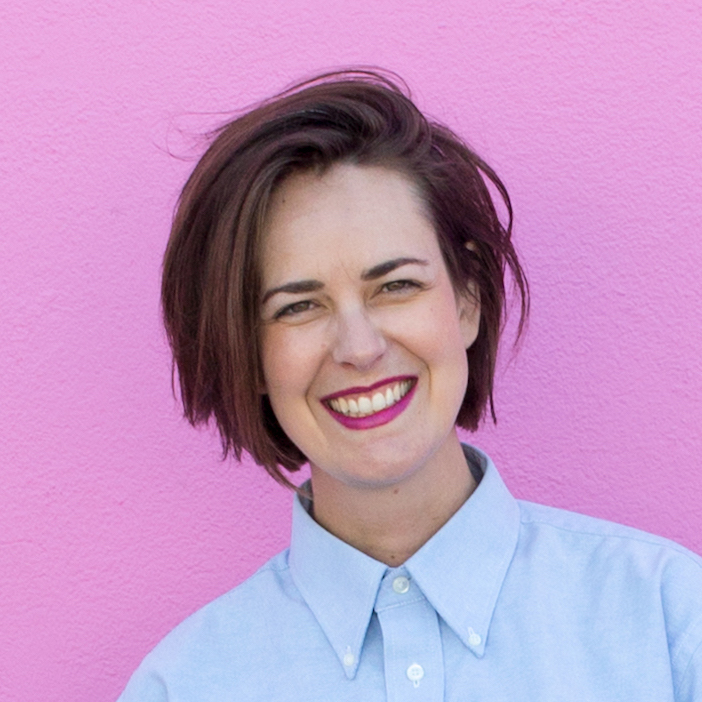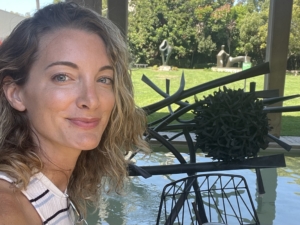Writing in Community: An Interview with Ann Friedman
 Ann Friedman is a journalist, essayist, and co-author of the best-selling book Big Friendship: How We Keep Each Other Close, with fellow writer Aminatou Sow, with whom she co-created and co-hosted the podcast Call Your Girlfriend. Friedman’s features and essays have appeared in The Cut, The Los Angeles Times, The New York Times, and ELLE. She is a contributing editor to The Gentlewoman. Her next book is about modern adulthood, and will be published by Viking Books in 2024. She also produces a popular weekly newsletter, the AF WKLY, through which she funds a year-long fellowship program for nonfiction writers.
Ann Friedman is a journalist, essayist, and co-author of the best-selling book Big Friendship: How We Keep Each Other Close, with fellow writer Aminatou Sow, with whom she co-created and co-hosted the podcast Call Your Girlfriend. Friedman’s features and essays have appeared in The Cut, The Los Angeles Times, The New York Times, and ELLE. She is a contributing editor to The Gentlewoman. Her next book is about modern adulthood, and will be published by Viking Books in 2024. She also produces a popular weekly newsletter, the AF WKLY, through which she funds a year-long fellowship program for nonfiction writers.
I was grateful for the opportunity to interview Ann about writing as a conversation and the value of writing in community.
Ashlee Laielli: As someone who works collaboratively and provides a fellowship to emerging writers, I would love to hear about how those values are a part of your writing practice. Where, for you, did these values come from, and how did they make their way into your work as a writer?
Ann Friedman: Community has always been important to me, both personally and professionally. I think that’s a value I picked up from my parents, with a healthy boost from my own extroverted tendencies. I also spent my early career as a magazine editor, which is an extremely collaborative job. So all of these things naturally affect my writing practice now that I am self-employed. I love discussing work with other writers and, sometimes, actually writing alongside them.
AL: My idea of being a writer has been firmly rooted in the notion of writing in conversation, an approach of which you are an exemplary force, with your work on Call Your Girlfriend and Big Friendship, and in your forthcoming nonfiction book ADULTHOOD with its grounding in interviews. I’m curious how you have seen your work evolve through the process of these collaborations, and how you understand this collaborative approach to have shaped you in ways writing on your own would not have.
AF: Collaboration introduces new ideas, removes the doubts that come with feeling like I’m all alone in my pursuits, and also adds some necessary pressure in the form of accountability to others. It makes me more likely to follow through on deadlines and more likely to question my ideas. It pushes me to articulate myself clearly, and to try again when I fail to do so. Sometimes I have no idea I’ve even formed an opinion about something until I hear the words coming out of my mouth in conversation. I’m always better in dialogue than I am when I’m putting words on the page alone. There’s at least one good conversation behind every piece of writing I’ve ever done.
AL: I am intrigued by collaborative writing projects and would love it if you could share some things you’ve learned about how to create them.
Collaboration introduces new ideas, removes the doubts that come with feeling like I’m all alone in my pursuits, and also adds some necessary pressure in the form of accountability to others. It makes me more likely to follow through on deadlines and more likely to question my ideas. It pushes me to articulate myself clearly, and to try again when I fail to do so.
AF: My earliest collaborative writing project was a group blog, and that project taught me a lot of lessons about trust and accountability when working with a group. One lesson is that everyone’s work is not always visible to everyone else, so it’s important to regularly and explicitly check in about what everyone is doing behind the scenes. Communicate! Which is, coincidentally, the same skill that Aminatou and I had to practice as we co-wrote Big Friendship. We probably spent an hour talking for every paragraph that ended up on the page. We also made a conscious decision to write the entire book in a “we” voice so that readers wouldn’t be tempted to take sides and reviewers wouldn’t be able to compare our sections. The whole thing was a joint endeavor, and we wanted it to be received as such.
AL: I noticed that on your website under “about” your personal bio is followed by a section on “collaborators” in which you feature and link to members of your writing community. This struck me as yet another way you actively ground all you do in a communal mindset. How do you see a focus on collaboration and community shaping your choices at various scales in your work life? Do you have any advice for others on how to put these values into action?
AF: Our culture loves to venerate a lone genius. There is a perception that self-employed writers are all alone—that their successes are exclusively the result of their own talent or hard work. Which simply isn’t true! We are all the product of our communities, so I wish it were more common to explicitly cite them. We already have models for community citation in writing—that’s what the “acknowledgments” section of a book is—and I’m just extending the concept to my website. It honestly feels straightforward to me, not radical.
AL: In your Longform interview, you note the value of “kissing down and sideways” as opposed to “kissing up.” In another one of your interviews, discussing how you built your career as a freelance writer, you mentioned thinking of yourself as a business you are investing in, which came to mind while reading the description of your fellowship program, when you note that you do not have the resources of a university or magazine. It feels notably generous for an individual writer to create a mentorship program where they are not selling their time and wisdom, but actually providing their mentees with a stipend. I’m wondering if you see this shift—away from “kissing up” and towards “kissing down and sideways”—in your writing community at large. Was there any precedent for your fellowship?
AF: To be fair, I also sell my time and expertise in the form of consulting and workshops—it’s just that I don’t exclusively monetize my expertise. I definitely think of the fellowship as an exchange rather than an act of charity. Now that I am more than a decade deep into self-employment, adding to my professional community in the form of this fellowship is of huge benefit to me. I sharpen my ideas, get really helpful feedback, and learn about the ways this industry is evolving thanks to my relationships with the fellows. I honestly have no idea why more comfortably self-employed writers are not trying to meaningfully connect with those who are still establishing their careers. (Maybe many of them are, and it’s just not visible to me!) I don’t want to get another decade deeper into my career and find that my entire writerly community calcified in 2011. I’m really trying to play a long game, and the fellowship helps with that.
AL: You write about all kinds of things and I’m curious, how do you decide which questions to pursue? How does an essay or book project come about and evolve for you?
Hitting “publish” or submitting a draft will get easier with time, but you have to practice that part, too. Remember that writing is something you do, not something you are. So if you’re practicing—if you’re putting words on the page even though they feel inadequate—you are not an “aspiring” anything. You are a writer.
AF: If I find myself discussing a topic with several different people in my life, or if I find myself returning to a question again and again, that’s usually a sign I should write about it. But I don’t always get to choose! Some of it comes down to what there is a market for. I have many more pitches rejected than accepted. I had a whole book proposal I was very excited about, but it failed to sell. If I were a hobbyist, that’s the book I’d be writing now. But since this is my job, I regrouped and sold a different book.
AL: Lastly, I’d love to hear your favorite thoughts to share with emerging writers.
AF: Stop waiting for permission, or for a magical moment when you are going to feel ready to transition all those brilliant ideas from your notes app into an actual draft. You must practice. Writing is a vulnerable act, and your words on the page will never match the perfect vision you had in your head. Let that fuel you, though. Don’t let it shut you down. Work on trying to close the gap between your glorious perfect vision and what ends up in your docs. (There’s a reason most of my rough drafts are labeled with words like “TRASHDRAFT” or “NOODLING.” It helps me accept that the gap is gonna be there no matter what.) Hitting “publish” or submitting a draft will get easier with time, but you have to practice that part, too. Remember that writing is something you do, not something you are. So if you’re practicing—if you’re putting words on the page even though they feel inadequate—you are not an “aspiring” anything. You are a writer.
Ashlee Laielli has an MFA in Creative Nonfiction from Antioch University Los Angeles. Her work has been published in the Normal School and Nat. Brut. She was the winner of the 2022 Jericho Fellowship Essay Contest. She currently lives in San Diego with her husband and their two children.





